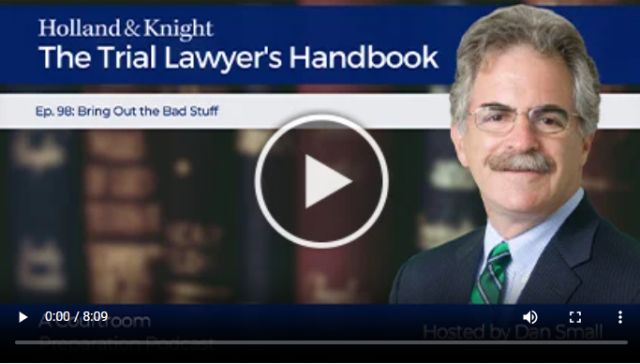- within Strategy topic(s)
In this episode of "The Trial Lawyer's Handbook," litigation attorney Dan Small examines the challenges of preparing witnesses for trial, emphasizing the importance of honesty and addressing unfavorable facts in advance. Mr. Small shares his experience working with Billy Breen, a former drug trafficker turned government informant in a Racketeer Influenced and Corrupt Organizations (RICO) Act case in Appling County, Georgia. He details the process of building trust with witnesses, explains how financial incentives and personal history can impact testimony, and highlights the strategy of bringing out damaging information on direct examination. The episode offers practical insights into effective witness preparation and underscores the value of transparency and credibility in the courtroom.
Listen to more episodes of The Trial Lawyer's Handbook here.
Mr. Small is also the author of the American Bar Association (ABA) book Lessons Learned from a Life on Trial: Landmark Cases from a Veteran Litigator and What They Can Teach Trial Lawyers.
Podcast Transcript
Dan Small: None of us are perfect, and so no witness is perfect. They all have issues, whether in their background, their prior statements or whatever. To prepare a witness, trial lawyers must:
- Develop some kind of a bond with a witness to create enough trust for them to be willing to tell you the whole truth.
- Push the witness to tell you the full truth, good and bad.
- Work with a witness to figure out the best way to tell it all, if need be.
What you don't know can hurt you. Badly. Tell your witness, "whatever it is, we can deal with it." What we don't want is for the other side to bring it out. Then it's not just the bad facts, it's the coverup. As I said during the Watergate scandal, the coverup can be worse than the crime. Something that could have been raised and dealt with on direct becomes powerful ammunition for cross-examination. When I was a prosecutor, we called this BOBS, B-O-B-S, Bring Out the Bad Stuff.
In the Appling County, Georgia, drugs, corruption and Racketeer Influenced and Corrupt Organization (RICO) case we've been discussing in prior episodes, BOBS was personified by Billy Breen. Billy was the broker, the middleman. If you're a buying a house, you might bring in a broker to help manage all the moving parts. The same is often true in criminal deals. That was Billy. He didn't do any of the physical crimes necessarily, but he brought together everyone: growers, importers, pilots, airstrip people, loading crews, truckers, etc. That's what he did in Appling County. And he was very good at it.
Until, on an unrelated deal, one of the parties thought Billy was cheating him. In a legitimate real estate deal, for example, if you thought someone was cheating you, you might hire a lawyer to sue him. Obviously, that wasn't an option in the criminal world. So when one side shot up Billy's house with AK-47s, Billy decided this was a sign that it was time to change sides. So he became a law enforcement informant, witness and eventually an undercover operative. He was all pretty successful. He even wrote a book about his exploits.
Meanwhile, though, by pure happenstance, the trial of my Appling County RICO case was the first of many times that Billy would appear as a government witness. So, as a trial lawyer from the DOJ's Organized Crime Strike Force, I was the first person to have to prepare him for testimony.
From the beginning, it was clear there was a problem. Billy was smart, articulate and proud. He knew he was good at what he did, and he wanted everyone else to know it, too. He had been God's gift to the criminal world, masterminding complex deals around the country. Now having changed sides, he thought he was God's gift to law enforcement, using his considerable knowledge to promote justice and get the bad guys. The bad guy had become a good guy, except I knew that no one would buy it. The more Billy talked about what a blessing he was to law enforcement, the more I could imagine defense counsel using his life of crime to rip him apart. Juries don't believe in miraculous transformations, and they don't like phonies. Billy's brand new "good guy" posture would be a disaster on cross-examination.
I had to be diplomatic, but firm. "Billy, I know how much help you will be to law enforcement, and the FBI knows too, but defense counsel is going to bring out all the bad stuff. You have to be completely open and honest about bringing it out first." I went through this with him over and over, hour after hour, day after day, with limited success. Finally, on the second or third day of working with him, Billy looked at me sadly and said, "Dan, you want me to come across as a bad guy!" We were finally getting somewhere. I said, "Billy, bad, but hoping to change. Remember what I told you. Question, pause, answer, stop. That's the rhythm of being a witness. Just tell the whole truth. Just tell the whole truth."
After a lot more work, he did. Marvelously. Billy took the stand on direct and laid out his long history of crime, openly and in great detail. His testimony about the Appling County defendants fit right into that history. The jury was horrified at his life of crime but riveted by it. This was the real Billy. And it was clearly the truth. When I finally sat down, after two days on direct, we were all exhausted.
Eleven defendants went to trial, and for a number of counsels and clients, cross-examining this awful government witness was going to be a highlight of their defense. But Billy had preempted them. One after another, they got up to cross-examine, brought out some bad things they had planned to beat Billy up with. But Billy could say, "Oh yeah, I talked about that on direct. You want me to tell about it again?" Or, "Yeah. Oh, and that reminds me, there's something I forgot to mention. Can I tell you that story too?" They were lost. There was nowhere to go. One by one, they sat down, having gotten nowhere.
Finally, the last defense counsel got up. I could see that he had a box of files, all carefully organized, of documentation of the bad things with which to accuse Billy. But all he could do was to look at his box of files forlornly. The jury had already heard it. Nevertheless, he tried nobly. He asked a bunch of aggressive questions about the bad stuff, which Billy agreed with. And finally, as a grand rhetorical flourish, he threw down his pen and shouted, "In fact, you haven't had an honest job in 20 years!" and sat down. Nice finish. We all started shuffling our papers, ready to move on to the next witness.
But Billy hadn't been prepared that way. He'd been prepared to tell the whole truth: question, pause, answer. So after a brief pause, he leaned forward into the microphone and said, "Actually, I think it's been 21 years since I had an honest job." And the jury, after all that tension, burst out laughing. Billy left the stand a career criminal, and yet an honest witness.
Most witnesses' problems are not that dramatic. But whatever it is, develop the trust, find out what it is and bring out the bad stuff. You'll be glad that you did.
The content of this article is intended to provide a general guide to the subject matter. Specialist advice should be sought about your specific circumstances.


